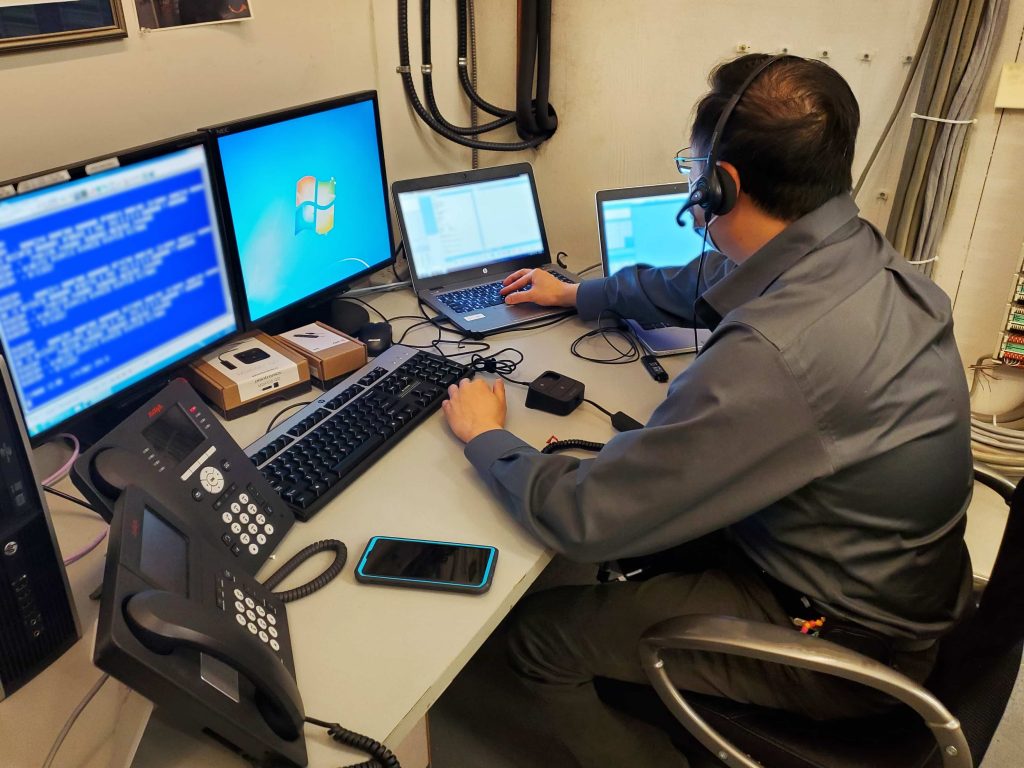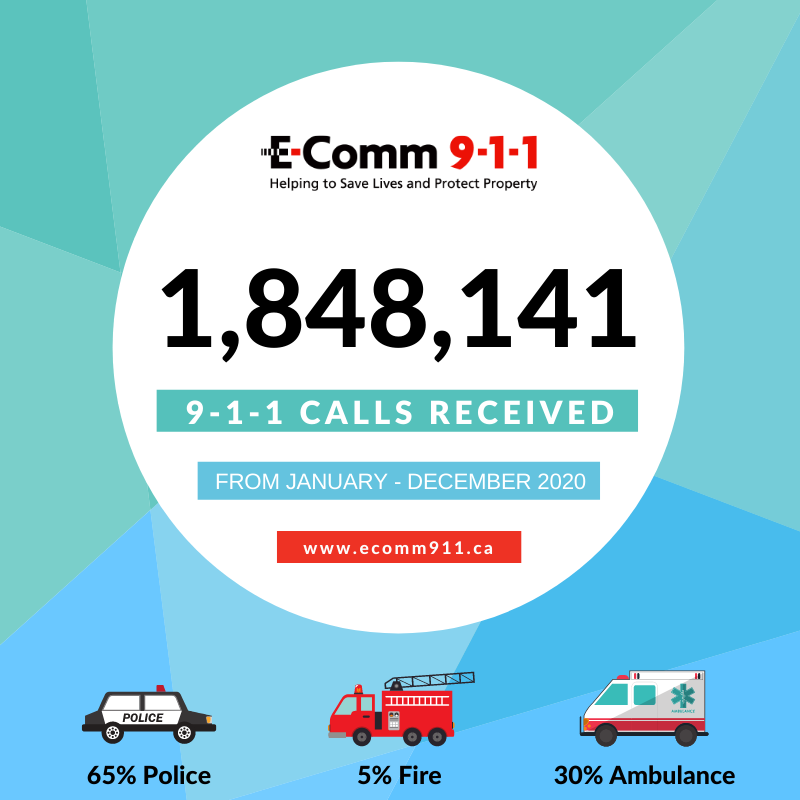NEWS RELEASE: B.C.’s 9-1-1 system one step closer to modernization
Vancouver, B.C. – April 27, 2021—E-Comm, in close collaboration with its technology partners at TELUS, Avaya, Komutel and NICE, has successfully received and transferred a voice call in a Next Generation 9-1-1 (NG9-1-1) test environment. NG9-1-1 is a Canada-wide initiative to evolve and modernize existing 9-1-1 services to adapt to emerging technology while ensuring the life-saving system remains effective, secure, and resilient. This marks the first successful test call transfer to be made over the new network, currently in development by TELUS; Western Canada’s 9-1-1 network provider.
The successful call transfer, completed earlier this month (April 1) from E-Comm’s Lower Mainland emergency communications centre to Calgary 9-1-1’s centre, is a monumental step towards B.C.’s province-wide transition to NG9-1-1. Interprovincial call transfers of this type, including the automatic transfer of critical information such as the caller’s location, are not currently possible with existing 9-1-1 systems anywhere in Canada. Nation-wide interoperability through the NG9-1-1 system will allow for more coordination and faster response should someone need to call 9-1-1 on behalf of a friend or family member across the country.
Although the existing 9-1-1 system is both resilient and reliable, these new upgrades will help adapt to the fast-paced evolution of modern technology. The new system promises enhanced calling features such as improved wireless location accuracy, additional information related to the 9-1-1 caller readily available to call takers, and improved interoperability and data sharing between 9-1-1 centres. All of these enhancements will aid in faster emergency response across the country, along with future capability to communicate with 9-1-1 call takers through a specialized Real-Time Text messaging service.
The next steps in E-Comm’s NG9-1-1 testing work, will be integrating the new call-handling system with existing emergency dispatch technology and conducting call transfer testing with additional emergency response agencies, such as BC Emergency Health Services.
E-Comm Quote
“Our Next Generation 9-1-1 efforts have been focused on ensuring our test environment matches the reliability and functionality of the existing 9-1-1 system. This first successful call transfer proves that we are nearing that stage. It’s a very exciting step in the shift to improved emergency communications, and ultimately emergency response, for the residents of British Columbia.” – Mike Webb, Chief Innovation Officer and NG9-1-1 project lead, E-Comm.
TELUS quote
“As B.C.’s 9-1-1 network provider, ensuring British Columbians have reliable access to 9-1-1 and emergency services is of the highest priority at TELUS. We are privileged to work alongside E-Comm and other partners to bring British Columbians the latest in 9-1-1 technology, ensuring better outcomes for those in need of vital emergency response and services.” – Marshall Berkin, VP of Industry Solutions, TELUS Business.
Avaya quote
“In situations where every second counts, situational awareness and seamless communication can make all the difference. This new ability to share real-time data and collaborate with public safety significantly breaks down communication silos and enables first responders with detailed, life-saving data. Avaya is the only communication solution provider spanning the continuum of public safety–from the enterprise office worker placing an emergency call, to the call takers answering 9-1-1 calls, to mobile first responders, and to healthcare professionals at hospitals and trauma centers. It’s a critical role and we are committed to driving continued innovation that can save lives.” Allan Mendelsohn, Principal Consultant, and Public Safety Practice Lead, Avaya.
Komutel quote
“This is an exciting milestone towards achieving a Next Generations 9-1-1 (NG9-1-1) infrastructure in order to better serve and protect people in Canada. We are very grateful to be collaborating with visionary partners like E-Comm and look forward to the successful launch of new 9-1-1 features and capabilities in the years to come.” – Yves Laliberte, President, Komutel.
NICE quote
“As a Public Safety leader with a rich history in IP communications, NICE is honored to partner with E-Comm on this NG9-1-1 modernization initiative. As a system of record for 9-1-1 centers, our NENA i3 compliant solution, NICE Inform, captures all next generation emergency communications to ensure they’re always available for evidence or quality assurance, and to give managers unprecedented insight into what’s performing, what isn’t and why.” – Chris Wooten, Executive Vice President, NICE.
Calgary 9-1-1 quote
“Calgary 9-1-1 is excited to be part of the work being done to prepare Canada for Next Generation 9-1-1. It has been a pleasure working with E-Comm and TELUS on these successful transfers and realizing the future that NG9-1-1 will offer. It has been an outstanding effort by the CRTC Emergency Services Working Group in guiding these collaborative efforts among 9-1-1 centers, equipment vendors and service providers. We look forward to continuing this journey that will transform our future by delivering new services such as real time texting, telematics and more for our citizens.” – Ravi Valavandan, Communication Systems Engineer, Calgary 9-1-1.

E-Comm Voice Systems Technologist Gary Tam performs successful NG9-1-1 Transfer Call on April 1, 2021.
-30-
About Next Generation 9-1-1
Next Generation 9-1-1 is a CRTC-mandated initiative requiring Canadian 9-1-1 network providers, such as TELUS and Bell, to work with Telecommunications Service Providers and Emergency Communications Centres across the country to evolve and modernize existing 9-1-1 networks, allowing them to adapt to new and emerging voice, text messaging and multi-media services. This new NG9-1-1 network will significantly enhance 9-1-1 service in Canada by changing to dedicated Internet-based networks that support modern new features while ensuring this life-saving system remains effective, secure, and resilient. The telecommunications regulatory structure for NG 9-1-1 was set out in CRTC Telecom Regulatory Policy 2017-182 and related decisions by the CRTC.
Media Contacts:
E-Comm
Kaila Butler
[email protected]
TELUS
Liz Sauve
[email protected]
Avaya
Alex Alias
[email protected]
Komutel
Genevieve Thibodeau
[email protected]
NICE
Chris Irwin-Dudek
[email protected]
Calgary 9-1-1
Media Line
403-828-2954




